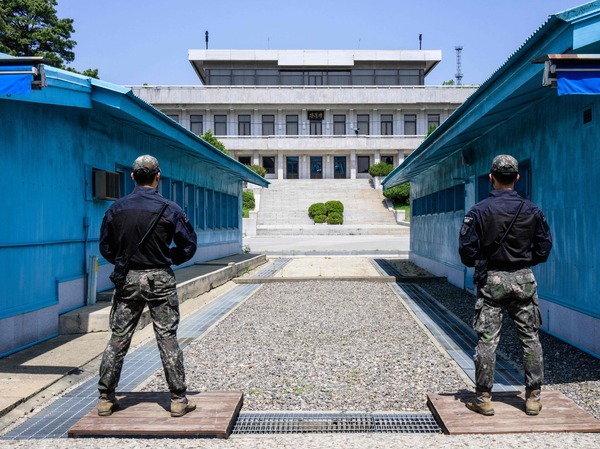Man who crossed North Korea border is a U.S. soldier, Pentagon official says

A U.S. man is believed to be in custody in North Korea after crossing the border without authorization, according to officials from the Pentagon and the United Nations body that oversees the Demilitarized Zone between North and South Korea.
“We believe he is currently in DPRK custody and are working with our KPA counterparts to resolve this incident,” the U.N. Command wrote on Twitter Tuesday, referring to North Korea by its formal name, the Democratic People’s Republic of Korea, and the country’s army.
The man is a U.S. service member who was touring the Joint Security Area, a border village between the two Koreas, when he “willingly” crossed the area’s Military Demarcation Line, said Col. Isaac Taylor, the head of Public Affairs for the United States Forces Korea.
A Pentagon official who spoke to NPR on the condition of anonymity added that the soldier was facing disciplinary action and was dressed in civilian clothes at the time of the incident. As of midday Tuesday, authorities were not ready to release the man’s identity given they had not yet notified his next of kin, the official said.
Create a More Connected Minnesota
MPR News is your trusted resource for the news you need. With your support, MPR News brings accessible, courageous journalism and authentic conversation to everyone - free of paywalls and barriers. Your gift makes a difference.
A woman who said she was part of the tour group described being at the last stop when she heard a loud “HA-HA-HA” and saw the man, who’d been with the group all day, run “between two of the buildings and over to the other side.”
“It took everybody a second to react and grasp what had actually happened,” she wrote in a Facebook post that's since been deleted. “Then we were ordered into and through Freedom House and running back to our military bus.”
The woman did not respond to NPR’s request for comment.
In a statement shared with NPR, the State Department said it was in touch with the Pentagon to provide assistance, but declined to comment further due to privacy considerations.
Defense Secretary Lloyd J. Austin said he expected to have more information on the event in the coming hours and days.
“I’m absolutely foremost concerned about the welfare of our troops,” he told reporters during a Tuesday briefing, offering little other information than what has already been confirmed.
The soldier’s detention Tuesday poses a fresh diplomatic challenge for Washington's wary relationship with North Korea, and it comes at a particularly tense time.
The regime under leader Kim Jong Un has been testing increasingly powerful intercontinental ballistic missiles in recent months. Last week’s test of an ICBM flew for a longer time than any of its previous missiles. In theory, such a weapon would be capable of hitting the U.S., NPR’s Anthony Kuhn reported.
Also last week, the U.S. sent a nuclear-armed submarine to the shallow waters off the Korean Peninsula, a move designed to reassure South Korea, a U.S. ally, Kuhn told All Things Considered.
North and South Korea stopped fighting in 1953 with an armistice agreement, but are still technically at war.
The DMZ divides the two Koreas, approximately around the 38th parallel, and serves as the de facto international border. It is heavily fortified and mined on both sides.
The U.S. State Department warns U.S. citizens against traveling to North Korea due to “the continuing serious risk of arrest and long-term detention of U.S. nationals,” including the “critical threat of wrongful detention.”
That travel warning was implemented in 2015, after U.S. college student Otto Warmbier was detained by North Korean authorities while touring the area. He was released to the U.S. in a coma in 2017 and died two days later.
This is a developing story and will be updated with more details. Please refresh the page for the latest version.
NPR's Tom Bowman contributed reporting from Washington D.C. and Se Eun Gong contributed reporting from Seoul.
Copyright 2023 NPR. To see more, visit https://www.npr.org.